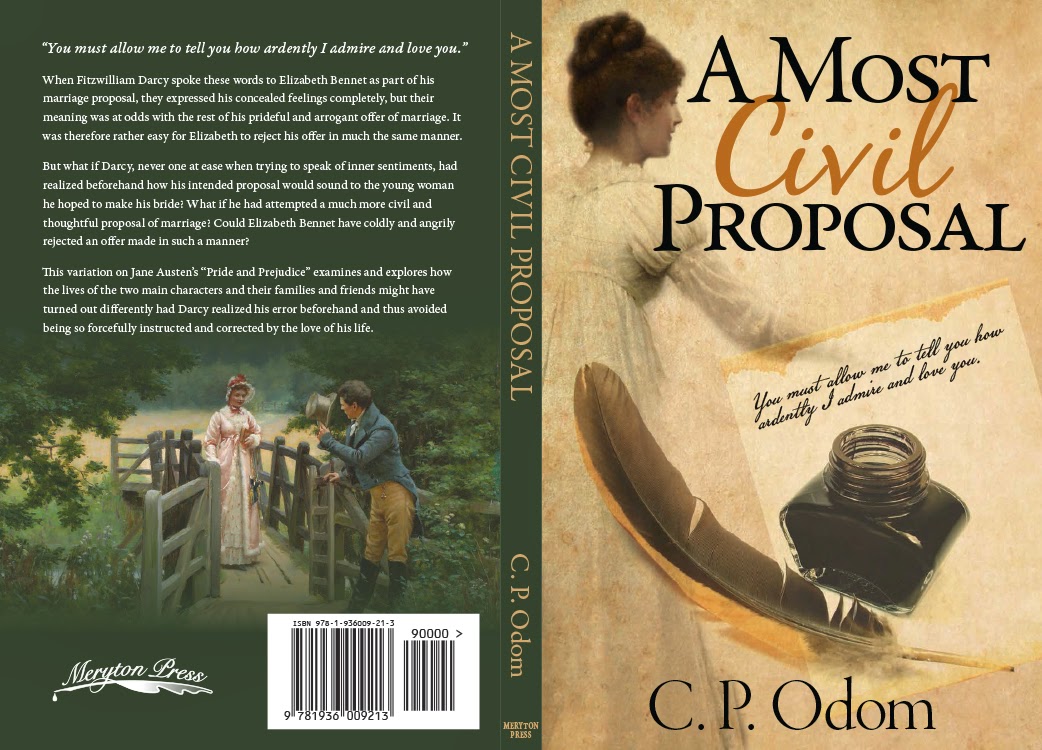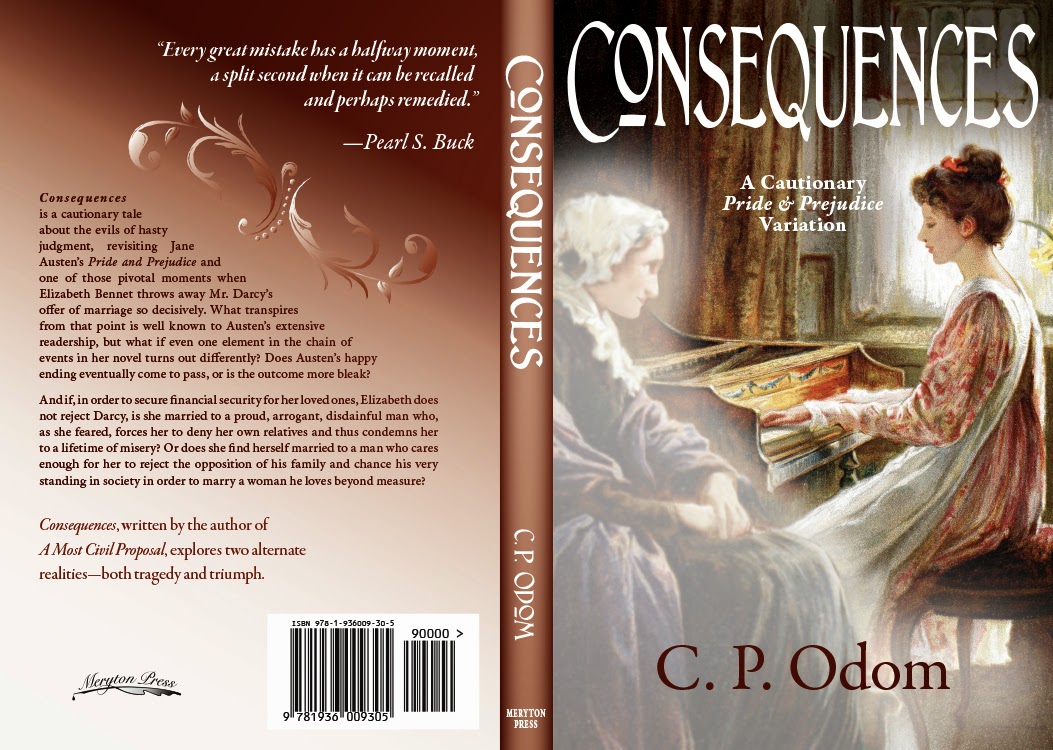One of the questions I am asked most often is what it is like to be one of the few male authors in the Austenesque genre, and the answer, a simple, straightforward answer, is that it hasn’t really been an issue. The overwhelmingly female readers of my fan fiction efforts, starting with A Most Civil Proposal in 2005, have been very nice, gracious, and rather complimentary at getting the male perspective. This has continued since an altered and edited AMCP became my first published novel in 2013, followed by Consequences in 2014.
Actually, I got more raised eyebrows and flat open-mouthed stares of astonishment from my male friends than my female readers—but that’s okay. I kind of like being able to shock my guy friends—it’s good for their assumptions to rock their cages!
A more difficult question is how I drifted into the Jane Austen world rather than trying to publish in the science fiction or historical fiction arenas, which have formed the bulk of my reading over the years (not that I completely neglected other areas, such as histories, mysteries, techno-thrillers (a la Tom Clancy and others), and a sampling of the classics). I didn’t have too many opportunities to visit the library when I was growing up, since it was a long way away, we only had one car, which my father took to work, and the rest of the family, while they certainly read books on occasion, did not read as compulsively as I did. In my early teens, I mowed yards during the summer (at $3.00 a yard) in order to be able to buy the thirty-five cent paperback science fiction books on the turning stands at the grocery stores and drug stores. For you younger reader, you’re probably wondering what this old dinosaur is talking about (I just turned 67, by the way), but that’s the way it was growing up in Oklahoma City in the late 1950’s. Actually, it was a transitional time, and paperback books made reading much more available to the general public than ever before. I still have a lot of those old paperback books, and the covers are a colorful and vibrant art form in and of themselves. My wife wonders why I have three or four copies of favorite old books, and it’s because I love the covers and how they changed as newer editions were published.
Anyway, I digress and, to get back to the question of whether I’m writing in the right genre, I will admit that it came as kind of a surprise to me also. I was an engineer for thirty-five years before retiring in 2011, a football player and Marine before that, and now I have three novels published (soon-to-be three, at least). And all three are in the genre one of my fellow engineers refers to as “chick lit.” (Of course, he also felt compelled to purchase and read AMCP because of the years we worked together, and he rather stunned me when he told me later that he enjoyed it and when was my next book coming out! People continually will surprise you.) Anyway, after I finally read Pride and Prejudice when I was going through my late wife’s books and decided I owed it to her to read one of her favorite books. I enjoyed it so much I rented and watched two P&P mini-series, after which I discovered several Austen fan fiction sites and read a number of well-written stories. Somewhere in there I came up with the idea of what became AMCP and started to write. That took a rather long time—about three times as it would today—with all kinds of starts, stops, ripping out large chunks of text, and generally making every mistake a first-time author makes. I had some experience in actually generating readable text from my engineering work, but I’m not sure how much generating project proposals, user manuals, and training guides prepares one for writing fiction. So there is a nutshell is how I came to be invited to post here today.
Now, on to my new book, Pride, Prejudice, and Secrets, which is, like my previous two efforts, a variation on P&P. I’ve read Austen’s other books (truth time: I couldn’t finish Mansfield Park – I had to skip to the end to see how it came out), but somehow I keep coming back to P&P. Part of that is because I like it best of all Austen’s books, but something in it calls to me, and my plot bunnies all seem to go back to it (including a prospective new book that is partway between the science fiction/fantasy arena and Jane’s world. I’ll have to see if that one every gets written). I had some familiarity with the time period, both because of my interest in history and my reading of several naval historical fiction series (C. S. Forester and Patrick O’Brien, among others), so I wasn’t as confused by the different social customs as I might have been. In fact, I think that the civility, manners, and politeness which are so much a part of Austen’s world is one of the most compelling attractions to me, since it seems like such behavior has all but disappeared from our present culture. Present company excepted, of course, which is another reason I like to hang out here. In my completely dispassionate opinion, whoever invented the phrase “Let it all hang out!” (defined as “Be totally candid in expressing feelings and opinions; hold nothing back.”) is a twit, and I’d love the opportunity to tell him so—in the most polite and civil manner, you understand, since we former Marines are well-known for our sensitivity.
Unlike my two previous novels, PP&S is a completely new novel, written last year in the spring and never previously published in any form, either as fan fiction or anything else. It is also longer than my other books and covers a lot of territory, not only with Darcy and Elizabeth but with several subsidiary characters and subplots. It’s not like a Tom Clancy omnibus, but it does come in at about 345 pages. In my dedication, I give a tip of the hat to my eldest daughter, Mikaelie, since she was instrumental in providing a rationale for how Elizabeth Bennet might wind up with everyone believing she was engaged to Darcy (including Darcy himself), while our heroine was wondering what elephant just ran over her and disrupted her entire life. She made an idle comment about not having to worry about the latest health scare since she “doesn’t get sick.” She says it’s because she always drinks after everyone else and thus keeps her immune system working at high efficiency as it develops antibodies for the illnesses which send we mere mortals to our sickbed. Ah, the delusions of the young—except that the last time she missed school because of illness appears to have been in the fifth grade, and she’s now in her second year of college!
So Elizabeth, in a blurry and hazy state because she is ill for almost the first time in her life, gives Darcy a nod of acknowledgement when he falls to a knees and simply asks for her hand in marriage. Before she knows what has happened, Charlotte re-enters the room (having cleverly left in order to give Darcy his opportunity), Darcy informs her of Elizabeth’s acceptance, and Elizabeth falls into a swoon (also a first) and is carried to bed. I had a bit of fun with the events here as the news sweeps through both the Darcy and Bennet circles faster than Elizabeth could have moved to counter it, even if she had been completely well. In fact, I had quite a bit of fun both with the main plot and some rather surprising subplots (at least, I hope the reader find them surprising and believable, since I attempted some rather unusual pairings among our characters).
So I’ll bring this post to an end, hoping I’ve whetted your appetite without giving away all the story lines. On topic to discuss before I go, however, is the title. My working title when I was writing and editing the book was “Secrets,” since the characters in my novel are virtually forced to be guarded rather than outspoken in what they say. For example, if Elizabeth does not break the engagement (rather difficult to do in the Regency), then she can never tell Darcy what she thinks of him, both for separating Jane and Bingley and of blasting Wickham’s hopes. So Darcy thinks Jane is indifferent to Bingley, and Elizabeth doesn’t learn of Wickham’s transgressions against the Darcy family, etc., etc., etc. In any case, “Secrets” eventually became Pride, Prejudice, and Secrets after my editor pointed out there were more than a dozen novels on Amazon with the title of Secrets, with the only differentiation being the author. She pleaded for a change of title, and I’ve learned to listen to her advice, so we eventually settled on the new title. And for those concerned after reading Consequences that I have a morbid element in my psychology, let me assure you that book was a one-off. There is some inevitable stress and worry in PP&S, but no undue angst. I hope those who take a chance on this book have a good experience reading it, and I’ll close by thanking Ceri for the opportunity to visit with you. Happy New Year, everyone!



